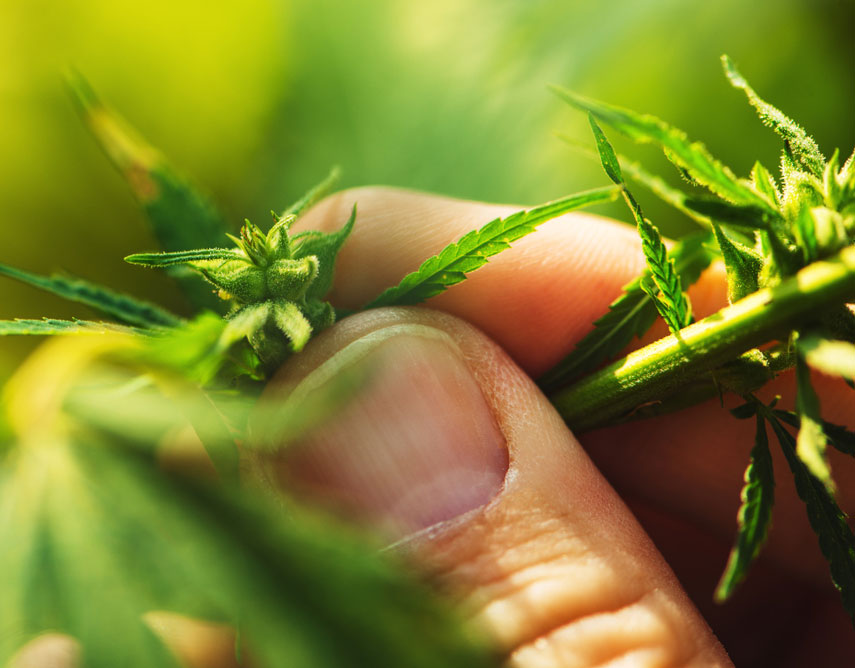One of the buzzy words floating around the CBD industry is something called the entourage effect. The theory is that the combination of the therapeutic compounds found in the hemp plant have different physical or psychological effects than a single compound would have on its own. This has made full-spectrum and broad-spectrum cannabidiol (CBD) extracts increasingly popular, with many people believing these to be superior to any other type of CBD product.
Let’s take a look at what the entourage effect really is, how it works, and whether full- or broad-spectrum CBD oils are truly always the best option.
Full- and Broad-Spectrum vs. Isolate CBD Oils
But, before delving into the entourage effect, let’s take a step back and look at three of the most widely available and popular types of CBD oils on the market, and the differences between each.
Full- and Broad-Spectrum CBD Oils
Full-spectrum and broad-spectrum CBD oils are derived from whole-plant extracts. This basically means that the final product contains all or most of the cannabinoids, terpenes and other potentially beneficial plant compounds that are found in the hemp plant. Full-spectrum CBD oils contain some tetrahydrocannabinol (THC) ( less than 0.3 percent per federal limits), and broad-spectrum CBD extracts have had all of the THC removed.
Isolate CBD Oils
As the name suggests, CBD oils made from isolates that contain only CBD isolate crystals, which are usually around 99-plus percent pure cannabidiol. This is then mixed with a carrier oil to form the final product. Carrier oils such as hemp seed (not to be confused with hemp oil) or MCT oil can sometimes have their own therapeutic properties and may contain favorable nutrients such as vitamins and omega 3 and 6 fatty acids.
The Entourage Effect
The concept of the entourage effect was first introduced in 1998 by a group of Israeli scientists that included “the father of cannabinoid research”: biochemist Dr. Raphael Mechoulam. They discovered that all of the compounds found in the hemp plant, which include all of the different cannabinoids, terpenes and flavonoids, work together synergistically, which makes for a more effective and potent therapeutic agent.
For instance, scientists found that when pure CBD is given to rats for the treatment of pain, dosages have to steadily increase in order to remain effective, eventually reaching a ceiling of effectiveness. However, when a full-spectrum CBD extract was administered, the analgesic effect remained constant, without required dosage increases or ceiling effects.
Similarly, a recent study of human breast cancer cells showed that a full-spectrum cannabis extract was more effective at reducing tumor size than pure THC alone. The researchers theorized that this is due to the presence of small amounts of other cannabinoids, such as cannabigerol (CBG) and tetrahydrocannabinolic acid (THCA) working together.
So too did a study on the anticonvulsant effects of CBD show similar results. Scientists compared the effects of five different types of cannabis extracts, all with the same amount of CBD but different cannabinoid and terpene profiles. They found marked differences between the effectiveness of each of the extracts in terms of seizure development as well as survival rates, highlighting the importance and relevance of these other plant compounds.
The theory behind these findings is that many of these plant compounds work both together, but also in different ways and on different parts of the body.
Although cannabinoids interact directly with the CB1 and CB2 receptors present in the endocannabinoid system and other parts of the body, other compounds bind to other types of receptors and targets in other parts of the body.
Similarly, there is also evidence that secondary compounds such as terpenes can help our bodies absorb and process cannabinoids more effectively by increasing their ability to cross the blood-brain barrier.
Is Full- or Broad-Spectrum Always the Best?
Before jumping to the conclusion that full- and broad-spectrum CBD oils are the only way to go, you might want to ask yourself if they are always the best.
The quick answer is no, not for everyone.
This ability of the different cannabinoids, terpenes and other therapeutic plant compounds to work together at the same time and on several different receptors within the body is not always a good thing. It can sometimes cause a kind of “chemical chaos” that isn’t necessarily needed or wanted.
Even plants from the same farm, grown right next to each other, can end up having different cannabinoid and terpene profiles from each other, which makes for inconsistency in what is found in your bottle of full- or broad-spectrum CBD oil. This can lead to the different cannabinoids ending up actually working against each other, which of course is the complete opposite effect than intended.
In the end, there are many different things to consider before deciding which type of CBD oil you want to use. It’s important to remember that your own personal physiological makeup, your needs and your lifestyle will all be factors in determining what is best for you.
Some people might be sensitive to certain compounds, and others might not want to have even the smallest amount of THC present in their bodies. For these individuals, a full-spectrum or broad-spectrum CBD oil is not a good idea. Similarly, for patients that need exact doses of certain compounds, precision-dosed isolates may work better.
Luckily though, our knowledge of the exact synergistic interplay between the different cannabinoids, terpenes and other plant compounds is growing. So too is our understanding of how to effectively harness the entourage effect, further driving the development of CBD products that are developed for specific needs and effects.





lee
2 Jul 2019while I believe in the medicinal power of cannabis and I support its legalization, I want to still say that anything you consume that’s too much for your body to take is bad.
Beatrice Eliason
19 Sep 2019very informative blog about entourage effects. thanks for sharing this with all